Remington Premier Bismuth Waterfowl .410 Gauge 3" #4 0.56 oz – 25rds – R20514 For Sale
$49.09
The Remington Premier Bismuth Waterfowl .410 Gauge 3″ #4 0.56 oz – 25rds – R20514 is a transformative option for hunters aiming to boost their field performance. Part of the prestigious Premier Bismuth line, this ammunition utilizes HEVI BISMUTH for its enhanced density, offering greater range and impact compared to traditional steel shots. This increased density allows for smaller shot sizes, leading to a higher pellet count per shot, which in turn ensures more precise shot placement and a higher success rate. Whether hunting in open prairies or dense forests, the Premier Bismuth delivers exceptional performance in various environments, making it suitable for both upland game and waterfowl hunting. Additionally, it provides a cost-effective solution, allowing hunters to upgrade their ammunition without significant expense, promising consistent, remarkable results throughout multiple hunting trips.
Can you shoot bismuth at waterfowl?
Yes, bismuth is a non-toxic alternative to lead shot and can be legally used for hunting waterfowl in many areas. Always check local regulations to ensure compliance with specific rules and guidelines regarding ammunition for hunting waterfowl.
Why are bismuth cartridges so expensive?
Bismuth cartridges are expensive primarily due to the high cost of bismuth itself. Bismuth is a rare metal, and its scarcity contributes to a higher market price compared to more common materials like lead or steel. Additionally, the production process for bismuth cartridges is more complex and costly, often involving specialized manufacturing techniques to ensure performance and reliability. These factors, combined with the demand for bismuth as a non-toxic alternative to lead in ammunition, drive up the price.
Is bismuth better than lead?
The answer to whether bismuth is “better” than lead largely depends on the context and criteria being evaluated, as both elements have distinct properties and uses:
1. **Environmental Impact**: Bismuth is often considered more environmentally friendly than lead. Bismuth is non-toxic and is increasingly used as a safer alternative to lead in products like fishing sinkers and ammunition.
2. **Toxicity**: Lead is highly toxic and poses significant health risks, particularly to children, if ingested or inhaled. Bismuth, on the other hand, is considered one of the least toxic heavy metals.
3. **Industrial Uses**: Lead has been widely used for various industrial purposes, such as batteries, radiation shielding, and historically in paints. However, its use is decreasing due to health concerns. Bismuth is used in pharmaceuticals, cosmetics, and low-melting-point metal alloys.
4. **Cost and Availability**: Lead is generally cheaper and more abundant than bismuth, making it economically favorable for certain applications where toxicity is not a concern.
5. **Physical and Chemical Properties**: Both elements have distinctive properties that make them suitable for different applications. For example, bismuth has a lower melting point and expands upon solidification, which can be advantageous in specific manufacturing processes.
In summary, bismuth is often considered “better” than lead from an environmental and health perspective. However, lead has advantages in terms of cost and widespread availability for industrial applications. The determination of which is better depends on the specific requirements and priorities of the application in question.
Is TSS better than bismuth?
The question of whether TSS (Tungsten Super Shot) is better than bismuth depends on the context, particularly in the realm of hunting ammunition or shot pellets. Here’s a brief comparison:
1. **Density and Energy**:
– **TSS**: Tungsten Super Shot is much denser than lead and bismuth, typically around 18 g/cm³. This higher density allows it to retain energy better at longer distances, improving penetration and effectiveness.
– **Bismuth**: Bismuth shot is denser than steel but less dense than Tungsten, around 9.6 g/cm³. It is a good non-toxic alternative to lead but doesn’t match TSS in terms of energy retention and penetration.
2. **Performance**:
– **TSS**: Provides superior ballistic performance, making it effective for hunting game at longer ranges. It’s often used for turkey and waterfowl hunting due to its stopping power.
– **Bismuth**: Offers good performance and is effective for many hunting scenarios, especially ducks and smaller game birds. It’s softer than TSS, which can be easier on gun barrels.
3. **Cost**:
– **TSS**: Typically more expensive than bismuth and other alternatives due to its superior performance and the cost of tungsten.
– **Bismuth**: Less expensive than TSS, making it a more budget-friendly option for hunters looking for non-toxic shot materials.
4. **Environmental Impact**:
– Both TSS and bismuth are non-toxic alternatives to lead, which is a major consideration for environmental protection and meeting regulations in many areas.
In summary, TSS can be considered better than bismuth in terms of performance and effectiveness, especially for long-range shooting and hunting. However, bismuth may be better for those seeking a cost-effective and non-toxic alternative with adequate performance for many hunting needs. The choice ultimately depends on specific hunting requirements, budget, and personal preferences.
Can I shoot bismuth through a full choke?
Yes, you can shoot bismuth through a full choke. Bismuth is softer than steel and behaves more like lead when fired, making it suitable for use with tighter chokes, including a full choke. However, it’s always a good idea to check the manufacturer’s recommendations for your shotgun and shells to ensure compatibility and safety.
What is the only legal gun that can be used to take waterfowl?
The only legal gun that can be used to take waterfowl in the United States is a shotgun that is capable of holding no more than three shells, including the one in the chamber. This is according to federal regulations, specifically the Migratory Bird Treaty Act, which governs the hunting of waterfowl. The shotgun must not have a capacity greater than three shells unless it is plugged with a one-piece filler, which is incapable of being removed without disassembling the gun. Additionally, the use of non-toxic shot, such as steel or other approved alternatives, is required.
Can you shoot bismuth in old shotguns?
Using bismuth shot in old shotguns is generally considered safe and is often recommended as an alternative to lead shot. Bismuth is softer than steel shot and has a density closer to that of lead, which reduces the risk of damage to older shotgun barrels that may not be designed to handle the hardness of steel. However, it’s always important to check the specific recommendations for your shotgun model and consult with a gunsmith if you’re unsure, as some very old guns might still have issues with pressure or other factors.
How much does a pound of bismuth cost?
As of the latest available data, the price of bismuth is typically in the range of $5 to $15 per pound. However, prices can fluctuate based on market conditions, supply and demand, and other economic factors. For the most accurate and current pricing, it’s best to check with metal suppliers or financial market reports.
What size bismuth shot for geese?
For hunting geese, a common recommendation for bismuth shot size is No. 2 or BB. These sizes provide enough weight and energy to effectively and humanely bring down geese at typical shooting distances. Always ensure that the specific size complies with local regulations and conditions.
Can you mix lead and bismuth?
Yes, you can mix lead and bismuth. These two metals can form alloys, commonly used for applications that require specific melting points or other properties. For example, lead-bismuth eutectic alloy is known for its low melting point and is used in applications such as low-temperature solders and certain types of nuclear reactors. However, handling lead requires care due to its toxic nature, so it’s important to follow safety guidelines if you’re working with it.
What size shot of bismuth to lead?
Bismuth shot typically weighs less than lead shot, so if you’re using bismuth as a substitute for lead in shotgun shells, you may need to adjust the size for performance. A general guideline is to use bismuth shot one size larger than the lead shot you would normally use for a similar effect. For example, if you would use #4 lead shot for a particular application, you might use #3 bismuth shot to achieve a similar performance.
What is a cheap alternative to lead shot?
A cheap alternative to lead shot is steel shot. Steel is commonly used as a non-toxic substitute for lead in shotgun ammunition due to environmental concerns and regulations against lead usage, particularly for waterfowl hunting. Steel shot is typically less expensive than other alternatives like bismuth or tungsten.
Can you shoot bismuth through Carlson choke tubes?
Yes, you can shoot bismuth through Carlson choke tubes. Bismuth is softer than steel, making it generally safe for use with choke tubes designed for lead shot, such as Carlson choke tubes. However, it’s always a good idea to check the manufacturer’s recommendations and ensure that the specific choke tube you are using is rated for the type of shot you plan to use.
Is bismuth shot safe in old shotguns?
Bismuth shot is generally considered safe for use in older shotguns. Unlike steel shot, bismuth is softer and has a density closer to that of traditional lead shot, which reduces the risk of damage to the barrel and choke of older firearms that were not designed for harder shot materials. However, it is still important to ensure that the bismuth shot size and loads are appropriate for your specific shotgun. It’s always advisable to consult your firearm’s manufacturer or a qualified gunsmith if you have any concerns about using alternative shot materials in an old shotgun.
What type of shot is illegal when hunting waterfowl in the US?
Lead shot is illegal when hunting waterfowl in the US. Hunters are required to use non-toxic alternatives, such as steel, bismuth, or tungsten-based shots, to prevent environmental contamination and protect wildlife health.
Be the first to review “Remington Premier Bismuth Waterfowl .410 Gauge 3" #4 0.56 oz – 25rds – R20514” Cancel reply
Related products
Remington Premier Bismuth Waterfowl
Remington Premier Bismuth Waterfowl 12 Gauge 2.75" #2 1.25 oz – 25rds – R20503
Remington Premier Bismuth Waterfowl
Remington Premier Bismuth Waterfowl 20 Gauge 3" #5 1.25 oz – 25rds – R20508
Remington Premier Bismuth Waterfowl
Remington Premier Bismuth Waterfowl 28 Gauge 2.75" #4 0.87 oz – 25rds – R20513
Remington Premier Bismuth Waterfowl
Remington Premier Bismuth Waterfowl 16 Gauge 2.75" #4 1.12 oz – 25rds – R20511
Remington Premier Bismuth Waterfowl
Remington Premier Bismuth Waterfowl 20 Gauge 2.75" #5 0.87 oz – 25rds – R20509
Remington Premier Bismuth Waterfowl
Remington Premier Bismuth Waterfowl 12 Gauge 2.75" #5 1.25 oz – 25rds – R20505
Remington Premier Bismuth Waterfowl
Remington Premier Bismuth Waterfowl 12 Gauge 3" #5 1.37 oz – 25rds – R20501
Remington Premier Bismuth Waterfowl
Remington Premier Bismuth Waterfowl 12 Gauge 3" #2 1.37 oz – 25rds – R20500
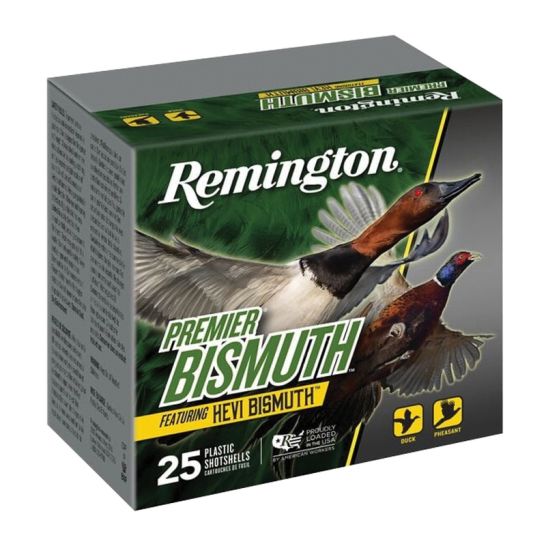
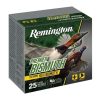
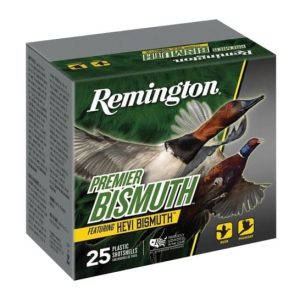
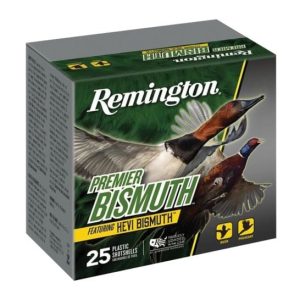
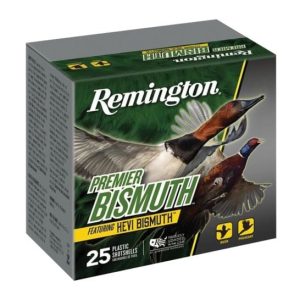
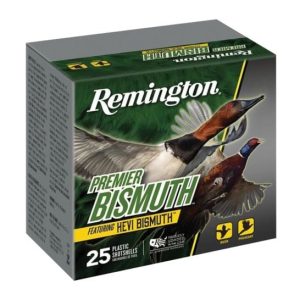
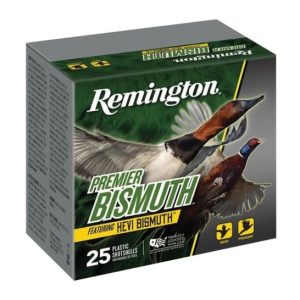
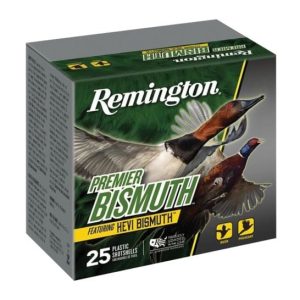
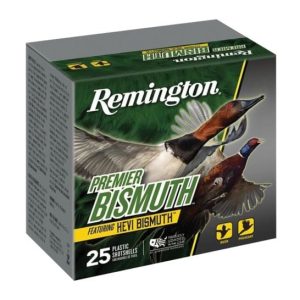
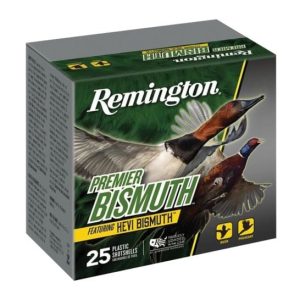
Reviews
There are no reviews yet.